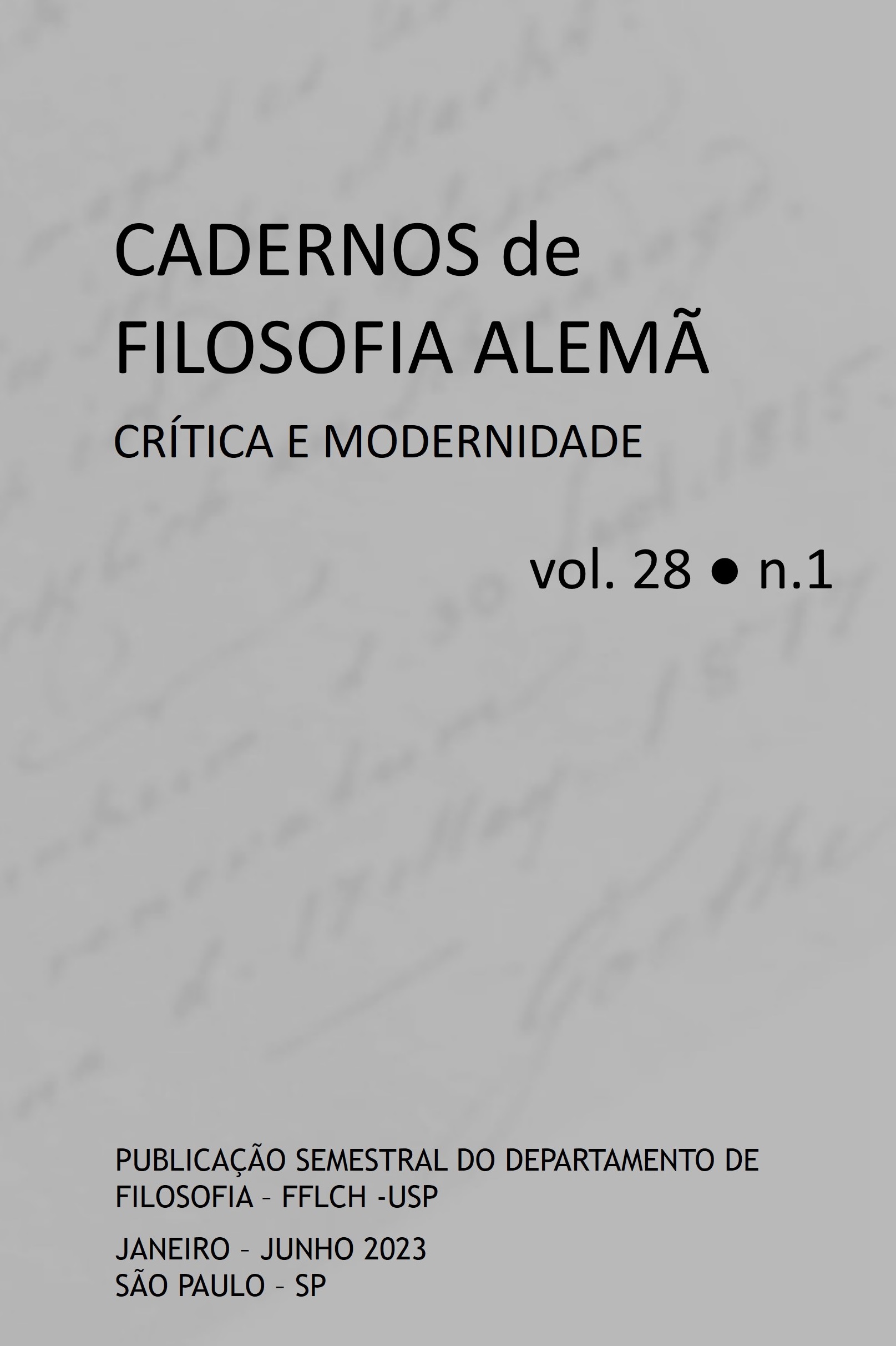Antecedentem creavit consequens: Friedrich Schlegel’s ontology of time and literary forms in Rede an die Mytologie
DOI:
https://doi.org/10.11606/issn.2318-9800.v28i1p61-74Palavras-chave:
Romantismo alemão, Schlegel, Nova mitologia, Ontologia, Teoria literáriaResumo
We attempt to offer a new interpretation of Schlegel’s original solution for the problem of the new mythology. We claim that, while grasping the problem of the missing center as the structure of modern thought, Schlegel develops a theory of literature which implies an ontology of time. We advance that, by identifying myth with romantic literature, Schlegel’s argumentative economy leads him to apply the metaphysical predicates of myth to romantic literature as such. We propose then to read the status of literary forms as constituting the substance which precedes them but, paradoxically, only exists through them.
Downloads
Referências
Billings J. (2014). Genealogy of the Tragic. Princeton: Princeton University Press.
Bowie, A. (1997). From Romanticism to Critical Theory: the philosophy of German literary theory. London: Routledge.
Bowie, A. (2003). Aesthetics and subjectivity. Manchester: Manchester University Press.
Eagleton, T. (1998). The Ideology of the Aesthetic. New Jersey: Blackwell Publishers.
Frank, M. (1989). Einführung in der frühromantischen ästhetik: Vorlesungen. Frankfurt am Main: Suhrkamp Verlag.
Frank, M. (1982). Der kommende Gott: Vorlesungen über die neue Mythologie. Frankfurt am Main: Suhrkamp Verlag.
Gadamer, H-G. (1996). Wahrheit und Methode: grundzüge einer philosophischen Hermeneutik. Tübingen: Mohr.
Gabriel, M. (2017). Ich ist nicht Gehirn. Berlin: Ullstein.
Gabriel, M. (2018). Der Sinn des Denkens. Berlin: Ullstein.
Gerhardt, V. (2022). Der Sinn des Sinns: Versuch über das Göttliche. München: C.H.Beck.
Hadot, P. (1995). Qu'est-ce que la philosophie antique ? Barcelona: Éditions Gallimard.
Hegel, G. W. F. (1986). Phänomenologie des Geistes. Frankfurt am Main: Suhkampf.
Hegel, G. W. F. (2018). Vorlesungen über die Ästhetik. Berlin: De Grutyer.
Heidegger, M. (2010). Kant und das Problem der Metaphysik. Frankfurt am Main: Vitorio Klostermann.
Iser, W. (2016). Das Fiktive und das Imaginäre. Perspektiven literarischer Anthropologie. 5.Auflage. Frankfurt: Suhrkamp.
Kant, I. (1974). Kritik der reinen Vernunft. Frankfurt am Main: Suhrkamp taschenbuch.
Kant, I. (1974). Kritik der Urteilskraft. Frankfurt am Main: Suhrkamp taschenbuch.
Koselleck, R. (1988). Vergangene Zukunft: zur Semantik geschichtlicher Zeiten. Frankfurt am Main: Suhrkamp Taschenbuch.
Krell, D. F. (2005). The tragic absolute: German Idealism and the Languishing of God. Bloomington: Indiana University Press.
Lacoue-Labarthe & Nancy (1978). L’Absolu Littéraire. Paris: Ed. du Seuil.
Larthomas, J.-P. (1994). Le paradoxe de l'idée esthétique. In : Janicaud, D. (Org.), Sur la Troisième Critique. Comas : Éditions de l'éclat.
Lavelle, L. (2015) Le moi et son destin. Paris, Éditions du Felin.
Medeiros, L. C. (2018). A invenção da modernidade literária. Belo Horizonte: Iluminuras.
Nunes, B. Literatura e Filosofia: uma transa. (2010). In: Pinheiro Sales V. (Org.), Ensaios Filosóficos. São Paulo: WM Martins Fontes.
Rosa, H. (2022). Unverfügbarkeit. Frankfurt am Main: Suhrkamp taschenbuch, 6. Auflage.
Schelling, F. W. J. (1998). Das Älteste Systemprogramm des deutschen Idealismus. In: Frank, M. e Kurz, G. (Orgs.), Materialien zu Schellings philosophischen Anfängen (pp.193-211). Frankfurt am Main: Suhrkamp.
Schelling, F. W. J. (1982). Philosophische über Dogmatismus und Kritizismus. In: Buchner et alt. (orgs.), Historisch-kritische Ausgabe, Band 3, Stuttgart: Frommann-Holzbog Verlag.
Schmidt, D. (2001). On Germans and other Greeks. Bloomington: Indiana University Press.
Schiller, F. (1958). Briefe zur ästhetischen Erziehung des Menschen. In: Werke, Zweiter Band. Baden: Deutsche Buch Gemeinschaft.
Schlegel, F. (1973). Fragmente. In: Hans, E.-H., Mohrlüder, G. (orgs.): Ironie als literarische phänomen. Berlin: Neue Wissenschaftliche Bibliothek.
Schlegel, F. (2000). Rede über die Mythologie. In: Uerlings, H. (orgs.) Theorie der Romantik (pp. 82-90). Stuttgart: Reclam.
Schlegel, F. (2000). Briefe über den Roman. In: Uerlings, H. Theorie der Romantik (pp. 90-102). Stuttgart: Reclam.
Seligmann-silva, M. (1999). Ler o Livro do Mundo: Walter Benjamin, Romantismo e crítica literária. São Paulo: Iluminuras.
Suzuki, M. (1998). O Gênio Romântico: crítica e história da filosofia em Friedrich Schlegel. São Paulo: Iluminuras.
Thibodeau. (2011). Martin Hegel et la tragédie grecque, Rennes, Presses Universitaires de Rennes.
Wolfe, C. (2009). What is post-humanism. Minnesota: University of Minnesota Press.
Zizek, S. (2007). The indivisible remainder: on Schelling and related matters. London: Verso.
Downloads
Publicado
Edição
Seção
Licença
Copyright (c) 2023 Gabriel Loureiro Pereira da Mota Ramos

Este trabalho está licenciado sob uma licença Creative Commons Attribution-NoDerivatives 4.0 International License.
As informações e conceitos emitidos em textos são de absoluta responsabilidade de seus autores.
Todos os artigos anteriores a 5 de julho de 2018 e posteriores a julho de 2021 estão licenciados sob uma licença CC BY-NC-ND, exceto os publicados entre as datas mencionadas, que estão sob a licença CC BY-NC-SA. A permissão para tradução por terceiros do material publicado sob a licença CC BY-NC-ND poderá ser obtida com o consentimento do autor ou autora.
Políticas de acesso aberto - Diadorim



